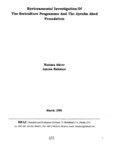| dc.contributor.author | Akter, Nasima | |
| dc.contributor.author | Rahman, Amina | |
| dc.date.accessioned | 2019-12-26T04:37:38Z | |
| dc.date.available | 2019-12-26T04:37:38Z | |
| dc.date.issued | 1998-03 | |
| dc.identifier.citation | Akter, N., & Rahman, A. (1998, March). Environmental investigation of The Sericulture Programme and The Ayesha Abed Foundation. Research Reports (1998): Social Studies, Vol – XXI, 351–414. | en_US |
| dc.identifier.uri | http://hdl.handle.net/10361/13351 | |
| dc.description.abstract | Objectives: Assessment of the potential environmental problems of the programme activities including
environmental and health concerns, identify remedial measures to reduce the adverse impact on the
environment and public health, and establish monitoring criteria to maintain the environmental quality
and sustainability of these programmes.
Methodology: Data were collected through interviews, discussion with programme personnel, field
observations, and laboratory analysis of water and soil samples. Variables include (separately for each
programme): process, activities, energy, chemical and material uses, waste generation and disposal, and
observed health and environmental problems.
Results: The major findings of the study were categorised under health effects and environmental
assessment of the programme. Employees of different sections suffer from various health problems.
These can be caused by direct or indirect exposure to environmental pollution and contamination. The
most important concern for environmental and public health issues is the disposal of waste water and
solid waste. Most of the chemicals found from laboratory analysis of waste water and sediment are
persistent in nature and have long residual periods. The results of analysed chemical samples showed a
higher value than the maximum allowable DoE (Department of Environment) standards for those
chemicals.
Conclusion: The results indicate that the health and environmental problem related to the
programme is acute. Based on the findings, recommendations were made in the report to lessen
environmental degradation and health hazards, and make the programmes more environmentally
sustainable. Some monitoring criteria are also discussed in this report. | en_US |
| dc.language.iso | en | en_US |
| dc.publisher | BRAC Research and Evaluation Division (RED) | en_US |
| dc.subject | Environmental investigation | en_US |
| dc.subject | Sericulture Programme | en_US |
| dc.subject | Ayesha Abed Foundation | en_US |
| dc.subject | BRAC | en_US |
| dc.subject.lcsh | Sericulture | |
| dc.subject.lcsh | Public health | |
| dc.title | Environmental investigation of The Sericulture Programme and The Ayesha Abed Foundation | en_US |
| dc.type | Research report | en_US |

